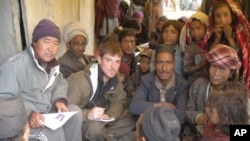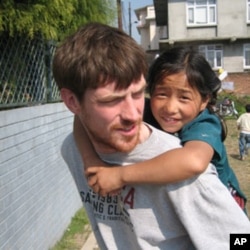As he approached 30, Conor Grennan decided to take a break from what he felt was a monotonous life.
Giving up his job and home, he took his life savings and planned a trip around the world, beginning with war-ravaged Nepal.
Once there, he began a three-month stint volunteering at an orphanage. Eighteen small children were living in the Little Princes Children's Home near Kathmandu. Grennan’s volunteer job was to take care of those children and teach them English.
“I was very worried about it because I never really spent much time with children before," Grennan says. "As soon as I got into that world, I really enjoyed it. We became very, very close by the end of my time there.”
That’s why he decided to return to Nepal a year later in 2006, as the civil war ended.
Grennan soon discovered those little children were not orphans.
“All these children had parents," he says. "They weren't orphans at all. These children had been actually taken because their parents feared that they would be abducted by the rebels. Their parents had actually paid these traffickers not knowing that the traffickers intended to sell their children. They thought they would take their children to protect them.”
Instead, he says, the children were sold and then abandoned.
Grennan estimates about 15,000 children were affected by this problem. That prompted him to embark on another journey - reconnecting trafficked Nepalese children with their families.
He established a non-profit group, Next Generation Nepal, in Kathmandu, and says the group has reconnected 300 Nepalese children with their relatives .
Nancy Wong has been a volunteer there since last August. She left her life in the United States behind to help make a difference for trafficked children.
Reuniting the children with their families is a process.
“The first step is rescuing these kids from exploitation and securing them into a transit home," Wong says. "We do that in partnership with the government of Nepal.”
The second step is searching for the biological family.
“One example is, recently we reconnected a girl who has been separated from her family since she was two," Wong says. "We had no name. We had no idea what part of Nepal she’s from. But our fantastic integration managers guessed from her facial features that she’s approximately from this area and they literally went from village to village, from bus stop to tea shop to tea shop to restaurants, asking for any clue. And we finally found her uncle.”
Even after lost children are reunited with their biological families, NGN continues to be involved, monitoring the children's progress, ensuring they are integrating well, are going to school and are not being exploited at home.
Grennan chronicles his Nepal experience in his memoir, "Little Princes." He says he wrote the book not only to help raise awareness about child trafficking, but also to show that anyone can make a difference.






